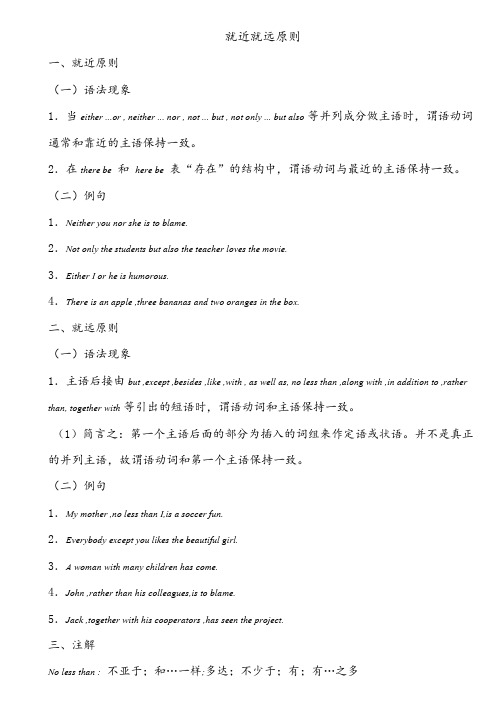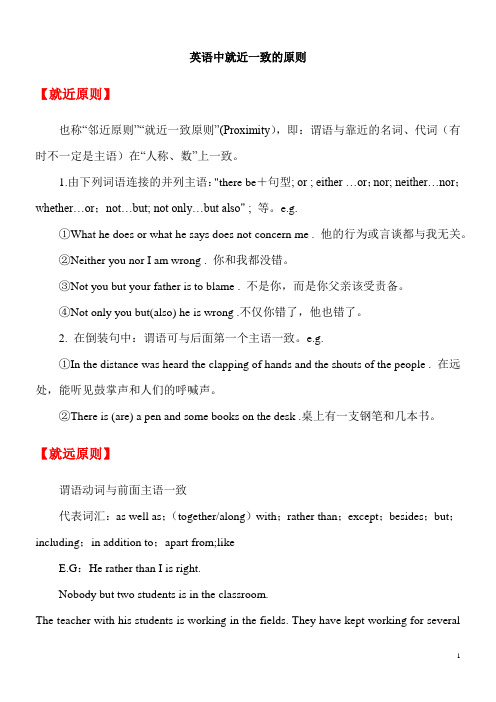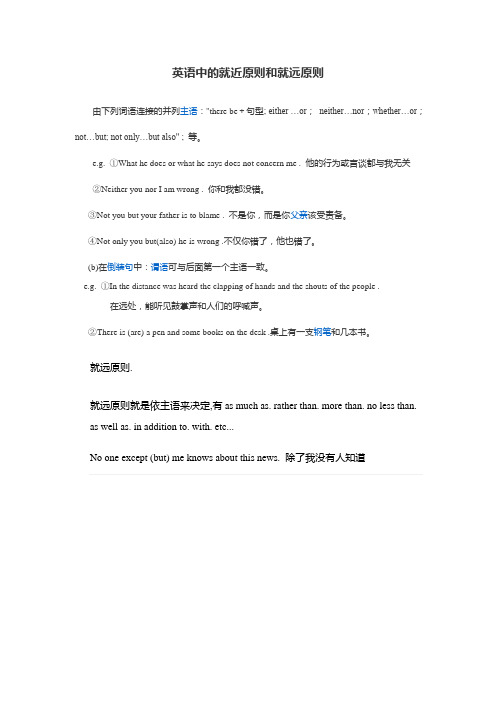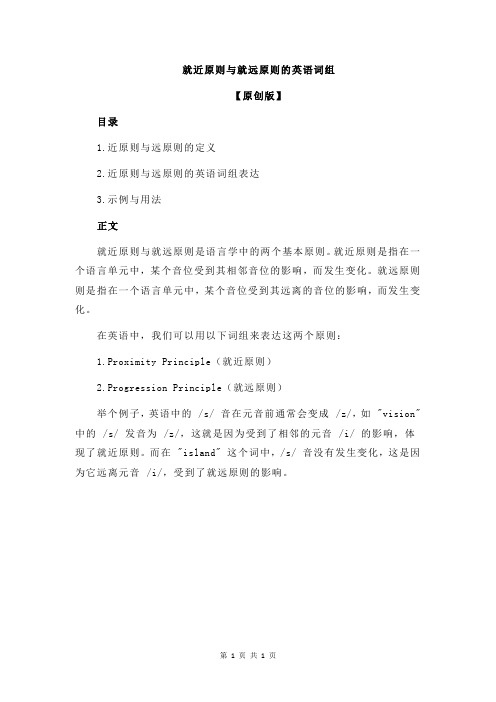英语中的就近原则和就远原则
02英语语法就近就远原则

就近就远原则一、就近原则(一)语法现象1.当either ...or , neither ... nor , not ... but , not only ... but also等并列成分做主语时,谓语动词通常和靠近的主语保持一致。
2.在there be 和here be 表“存在”的结构中,谓语动词与最近的主语保持一致。
(二)例句1.Neither you nor she is to blame.2.Not only the students but also the teacher loves the movie.3.Either I or he is humorous.4.There is an apple ,three bananas and two oranges in the box.二、就远原则(一)语法现象1.主语后接由but ,except ,besides ,like ,with , as well as, no less than ,along with ,in addition to ,rather than, together with等引出的短语时,谓语动词和主语保持一致。
(1)简言之:第一个主语后面的部分为插入的词组来作定语或状语。
并不是真正的并列主语,故谓语动词和第一个主语保持一致。
(二)例句1.My mother ,no less than I,is a soccer fun.2.Everybody except you likes the beautiful girl.3.A woman with many children has come.4.John ,rather than his colleagues,is to blame.5.Jack ,together with his cooperators ,has seen the project.三、注解No less than : 不亚于;和…一样;多达;不少于;有;有…之多Along with :与…一道,与…一起,共同,连同,和;作伴;随着2.(除…外)又…;加之In addition to :除…以外,除…之外还。
英语中的就近原则和就远原则

3
1. He or I am in the wrong, 他或是我错了。 2. Neither you nor he is tired. 你和他都没累。 3. Not you but I am to blame. 不该怪你而该怪我。 4. Either my father or my brothers are coming.
与比较远的那个主语保持一致,
简称“就远原则”)
5
1. Everybody except you is down on me. 除了你,大家都看不起我。
2. Nobody but two students is in the classroom. 只有两个学生在教室。
3. A woman with two children has come. 一位妇女带着两个孩子已经来了。
就 远
like, with, along(together) with, as well as, as much as, no less than, in addition to, combined
原 with, rather than 等引出的短语
则 时,谓语动词习惯上要与这些
结构前面的主语保持一致(即
大家好
1
由there be+句型, or,
就 近 原 则
either…or, neither…or, not…but, not only…but also等 连接的并列成分作主语时,
其谓语通常要与靠近的主语 保持一致。
2
e.g. ① There is a book and some pencils on the desk.
英语中的就近和就远原则

就近原则:1.There be 句型There is a book and some pencils on the desk.=There are some pencils and a book on the desk.2.neither...nor... Neither you nor he is right. = Neither he nor you are right.3.either...or... Either they or Jim is going to Shanghai next Saturday.= Either Jim or they are going to shanghai next Saturday.4.not only...but also... Not only Ann but also her parents stay at home every Sunday.= Not only Ann's parents but also she stays at home every Sunday.【主谓一致现象】有一类连接词,其后的谓语动词要与连接词前一部分的主语保持一致。
此类连接词有with, along with, together with, as well as, besides, like, without, except (but), including等。
例如:Tracy, like many girls, loves dancing. 特蕾西像很多女孩一样,喜欢跳舞。
All the students, including Tom, are leaving. 所有的学生,包括汤姆都走了。
No one except (but) me knows about this news. 除了我没有人知道就远原则代表词汇:as well as;(together/along)with;rather than;except;besides;but;including;in addition to;apart fromE.G:He rather than I is right.Nobody but(除了)two students is in the classroom.。
就远原则顺口溜

就远原则顺口溜
英语就近原则和就远原则口诀是就近,就近,谓语最近,就远,就远,隔得很远。
就近原则和就远原则是指英语语法原则。
就近原则也称“邻近原则”“就近一致原则”(Proximity),即:谓语与靠近的名词、代词(有时不一定是主语)在“人称、数”上一致。
就远原则就是谓语动词的变化,谓语动词与前面主语一致。
英语学习技巧:
1、学好英语离不开语言环境。
如何快速学好英语?学习英语要抓住本质,英语是一门语言学科,离不开沟通和交流,营造语言环境可以很好地均衡语言的输入和输出。
英语不同于我们的母语汉语,它是一种表音文字,也就是说,掌握了正确的发音方式,孩子才能更好地理解对话内容。
2、学好英语的基础是加强听说。
英语的学习需要遵循“听说,后读写”的客观顺序,反观传统的英语课堂,一味地要求孩子死记硬背,侧重应试能力的培养,听力训练不够,大班教学孩子开口的机会少之又少。
3、学好英语要培养良好的习惯。
学好英语是需要花费一定的时间和精力的,坚持下去才能更好地掌握这门语言。
所以,学习环境也很重要,大家在学习中一定要创造良好的学习环境。
英语中的就近原则和就远原则

6. John, rather than his roommates, is to blame. 约翰,而不是他的室友,应该受到责备。
4
1. Everybody except you is down on me. 除了你,大家都看不起我。
2. Nobody but two students is in the classroom.
只有两个学生在教室。
3. A woman with two children has come. 一位妇女带着两个孩子已经来了。
7. Your wife as well as you is friendly to me. 不仅你而且你的妻子也对我很友好。
8. My father, no less than I, is a base-ball fan. 我的父亲不亚于我也是个棒球迷。
精选版课件ppt
6
=There are some pencils and a book
on the desk. ②Neither you nor I am wrong . 你和我都没 错。
精选版课件ppt
2
1. He or I am in the wrong, 他或是我错了。
2. Neither you nor he is tired. 你和他都没累。
欣赏这部影片,他们的老师也在欣赏这部
影片。
精选版课件ppt
3
则就 远 原
当用作主语的成分后面跟有由
but, except, besides, including,
英语中的就近、就远原则以及同位语概念和练习

英语中就近一致的原则【就近原则】也称“邻近原则”“就近一致原则”(Proximity),即:谓语与靠近的名词、代词(有时不一定是主语)在“人称、数”上一致。
1.由下列词语连接的并列主语:"there be+句型; or ; either …or;nor; neither…nor;whether…or;not…but; not only…but also" ; 等。
e.g.①What he does or what he says does not concern me . 他的行为或言谈都与我无关。
②Neither you nor I am wrong . 你和我都没错。
③Not you but your father is to blame . 不是你,而是你父亲该受责备。
④Not only you but(also) he is wrong .不仅你错了,他也错了。
2. 在倒装句中:谓语可与后面第一个主语一致。
e.g.①In the distance was heard the clapping of hands and the shouts of the people . 在远处,能听见鼓掌声和人们的呼喊声。
②There is (are) a pen and some books on the desk .桌上有一支钢笔和几本书。
【就远原则】谓语动词与前面主语一致代表词汇:as well as;(together/along)with;rather than;except;besides;but;including;in addition to;apart from;likeE.G:He rather than I is right.Nobody but two students is in the classroom.The teacher with his students is working in the fields. They have kept working for severalhours. Nobody made them work for so long.主谓一致1 并列结构作主语时谓语用复数Reading and writing are very important.注意:当主语由and连结时,如果它表示一个单一的概念,即指同一人或同一物时,谓语动词用单数,and 此时连接的两个词前只有一个冠词。
英语中的就近原则和就远原则

英语中的就近原则和就远原则
由下列词语连接的并列主语:"there be+句型; either …or;neither…nor;whether…or;not…but; not only…but also" ; 等。
e.g. ①What he does or what he says does not concern me . 他的行为或言谈都与我无关
②Neither you nor I am wrong . 你和我都没错。
③Not you but your father is to blame . 不是你,而是你父亲该受责备。
④Not only you but(also) he is wrong .不仅你错了,他也错了。
(b)在倒装句中:谓语可与后面第一个主语一致。
e.g. ①In the distance was heard the clapping of hands and the shouts of the people .
在远处,能听见鼓掌声和人们的呼喊声。
②There is (are) a pen and some books on the desk .桌上有一支钢笔和几本书。
就远原则.
就远原则就是依主语来决定,有as much as. rather than. more than. no less than.
as well as. in addition to. with. etc...
No one except (but) me knows about this news. 除了我没有人知道。
就近原则与就远原则的英语词组

就近原则与就远原则的英语词组
【原创版】
目录
1.近原则与远原则的定义
2.近原则与远原则的英语词组表达
3.示例与用法
正文
就近原则与就远原则是语言学中的两个基本原则。
就近原则是指在一个语言单元中,某个音位受到其相邻音位的影响,而发生变化。
就远原则则是指在一个语言单元中,某个音位受到其远离的音位的影响,而发生变化。
在英语中,我们可以用以下词组来表达这两个原则:
1.Proximity Principle(就近原则)
2.Progression Principle(就远原则)
举个例子,英语中的 /s/ 音在元音前通常会变成 /z/,如 "vision" 中的 /s/ 发音为 /z/,这就是因为受到了相邻的元音 /i/ 的影响,体
现了就近原则。
而在 "island" 这个词中,/s/ 音没有发生变化,这是因为它远离元音 /i/,受到了就远原则的影响。
第1页共1页。
- 1、下载文档前请自行甄别文档内容的完整性,平台不提供额外的编辑、内容补充、找答案等附加服务。
- 2、"仅部分预览"的文档,不可在线预览部分如存在完整性等问题,可反馈申请退款(可完整预览的文档不适用该条件!)。
- 3、如文档侵犯您的权益,请联系客服反馈,我们会尽快为您处理(人工客服工作时间:9:00-18:30)。
--
--
英语中的就近原则和就远原则
由下列词语连接的并列主语:
"there be+句型; either …or; neither…nor;whether…or;not…but; not on
ly…but also" 等。
e.g.
①What he does or what he says does not concern me . 他的行为或言谈都与我无关
②Neither you nor I am wrong . 你和我都没错。
③Not you but your father is to blame . 不是你,而是你父亲该受责备。
④Not only you but(also) he is wrong .不仅你错了,他也错了。
(b)在倒装句中:谓语可与后面第一个主语一致。
e.g.
①In the distance was heard the clapping of hands and the shouts of the peo
ple .
在远处,能听见鼓掌声和人们的呼喊声。
②There is (are) a pen and some books on the desk .桌上有一支钢笔和几本
书。
就远原则.
就远原则就是依主语来决定,有as much as. rather than. more than. no less than. a
s well as. in addition to. with. etc...
No one except (but) me knows about this news. 除了我没有人知道
一、就近原则:
由or, either„or, neither„or, not„ but„, not only„but also等连接的并
列成分作主语时,其谓语通常要与靠近的主语保持一致。如:
He or I am in the wrong, 他或是我错了。
Neither you nor he is tired. 你和他都没累。
--
--
Not you but I am to blame. 不该怪你而该怪我。
Either my father or my brothers are coming. 不是我父亲就是我兄弟要来。
Not only the students but also their teacher is enjoying the film.
不仅学生们在欣赏这部影片,他们的老师也在欣赏这部影片。
但在非正式文体中,有时也一律用复数谓语(注:在考试时最好避免使用)。如:
Neither Ted nor Mark are wrong. 特德和马克都没有错。
If either David or Janet come, they will want a drink. 大卫或珍妮特来了的话,
是会要喝酒的。
二、就远原则
当用作主语的成分后面跟有由but, except, besides, including, like, wi
th, as well as, as much as, no less than, along with, in addition to, combined
with, rather than, together with等引出的短语时,谓语动词习惯上要与这些结构前面的
主语保持一致(即与比较远的那个主语保持一致,简称“就远原则”)。如:
Everybody except you is down on me. 除了你,大家都看不起我。
A woman with two children has come. 一位妇女带着两个孩子已经来了。
John, rather than his roommates, is to blame. 约翰,而不是他的室友,应该
受到责备。
Jim, together with his classmates, has seen the film. 吉姆和他的同学都看
过这部电影。
My father, no less than I, is a base-ball fan. 我的父亲不亚于我也是个棒球迷。
